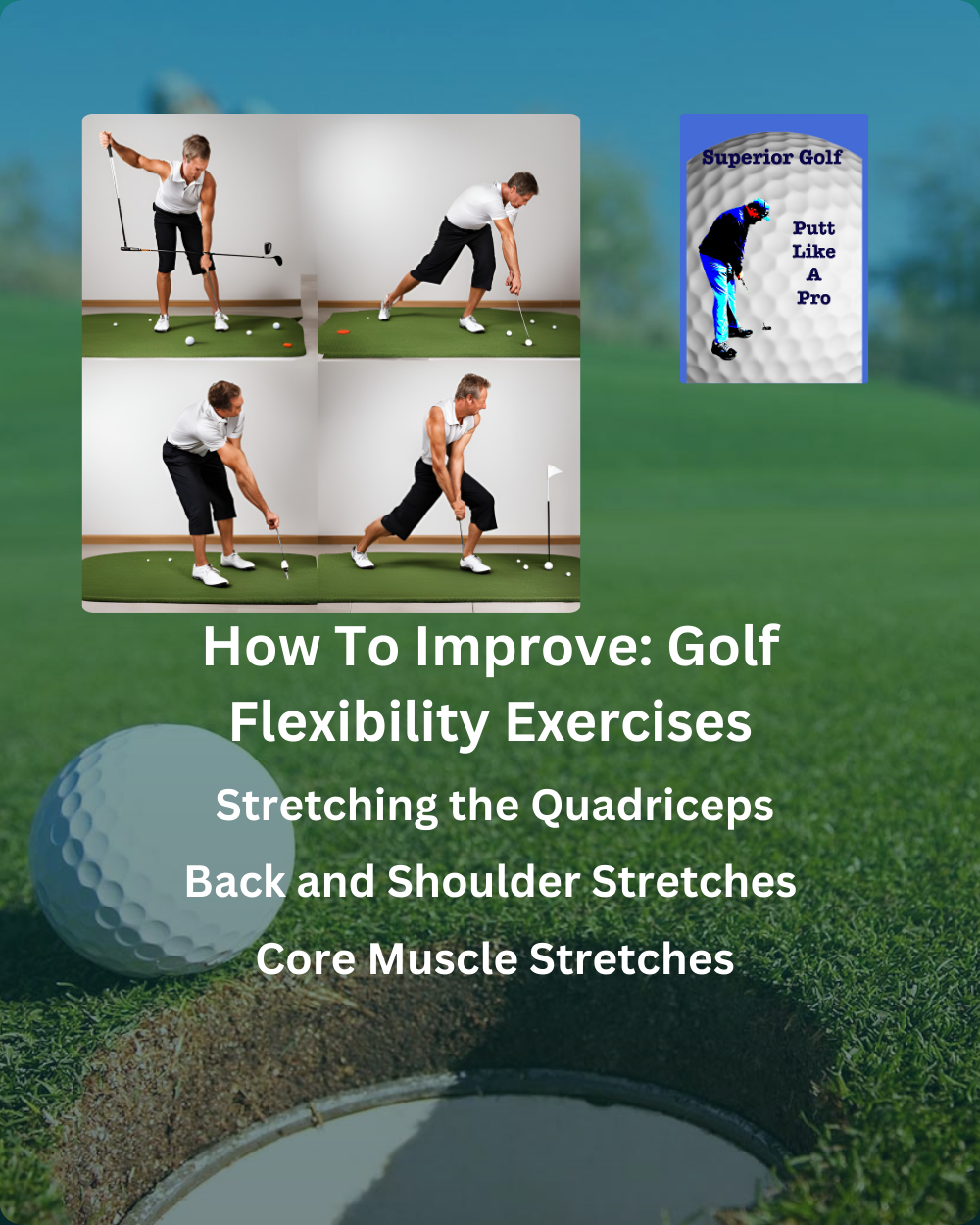Golf Flexibility Exercises: Imagine yourself on the golf course, with the cool morning breeze touching your face. You’re about to swing. But your body feels stiff, holding back your swing from reaching its best. This doesn’t have to be how it is for you. Using the right golf flexibility exercises can change your game. They help you achieve a smoother, longer swing and boost your golf fitness.
Before you start stretching, the Mayo Clinic recommends warming up for 5 to 10 minutes. A quick walk is great for getting your blood moving1. After warming up, stretch each muscle group for 30 seconds without bouncing. This is key for improving flexibility safely1. Stretch daily and before and after golf to keep your muscles flexible. This will help you do better on the course1.
Stretching your quadriceps helps improve your posture, which leads to stronger swings. Back stretches can reduce tension, making your backswing smoother2. Stretching your hips and core too can increase how far you can move. This makes your golf swing more athletic2. Regular stretching keeps your muscles from shrinking and keeps you at the top of your game each time you play.
Key Takeaways
- Engaging in golf flexibility exercises enhances your ability to execute a smoother and fuller swing, improving overall performance.
- Start with a 5 to 10-minute warm-up, like walking, before stretching to safely improve flexibility1.
- Hold each stretch for about 30 seconds without bouncing to avoid injury1.
- Daily stretching and pre/post-round stretches help maintain muscle flexibility and prevent atrophy12.
- Stretching the quadriceps improves posture for powerful swings, while hip and core stretches increase range of motion for a more athletic swing2.
Understanding the Importance of Flexibility in Golf
In golf, being flexible is very important. It affects your swing, strength, and motion. Having flexible muscles helps you perform better and prevents injuries. Keeping your muscles limber is key for a good golf swing.
Why Flexibility Matters
Flexibility really matters in golf. It helps you swing stronger and more steadily3. If you’re not flexible, you’re more likely to get hurt in parts like the neck, shoulders, back, and hips3. Stretching regularly fixes muscle imbalances and makes muscles work better4. This means better posture, alignment, and muscle usage for smoother swings4.
The Physical Demand of a Golf Swing
Your golf swing depends a lot on being flexible. Training to be more flexible makes your muscles work better and helps you control them4. It also keeps you from getting injured and boosts your golf game4. Good flexibility means you can stand right, turn fully, and hit the ball squarely3. This full turn lets you hit harder and farther3.
Common Flexibility Issues Among Golfers
Lacking flexibility leads to shorter swings and less balance. This can reduce your power and how far you can hit the ball. Golfers with stiff muscles can have bad swing habits, get tired quickly, and feel more pain4. It’s crucial to work on these flexibility issues because muscle health affects your swing4 and3. Golfers should focus on stretching to fix muscle imbalances4. Stretching is even more important for older players to keep up their game and avoid injuries3.
“Flexibility is not an option but a necessity for golf performance and injury prevention,” – Galvin Green emphasized.
Golfers need to stretch regularly to keep their swing muscles in shape. This includes the hips, glutes, and lower back. Some coaches now suggest to avoid traditional stretches. They prefer routines that don’t involve stretching for 20 minutes a day. They think stretching can make you weaker, which doesn’t help with a strong golf swing4.
Essential Golf Flexibility Exercises
A pre-golf warm-up gets your body ready for play. It focuses on big muscle groups like your thighs, back, shoulders, and tummy1. Doing stretches every day, and before and after you play, makes you more flexible and helps avoid getting hurt.
Warm-Up Techniques
Pro golfers like Adam Scott and Tiger Woods stretch before they play2. A good warm-up has stretches that work on various muscles. Start with some light jogging to get your blood flowing. Then do dynamic stretches such as walking lunges and torso twists to get moving.
Stretching the Quadriceps
Your thigh muscles are key for keeping you stable while you swing. The Mayo Clinic suggests a gentle stretch where you don’t bounce around1. Including these stretches helps you stand better and swing stronger2.
Back and Shoulder Stretches
It’s important to stretch your back and shoulders to keep your backswing smooth. Tight leg muscles can strain your back2. So, stretching to ease back pain and increase leg movement is vital. Try seat stretches for hip flexibility and ones that target your spine and chest2. Hold each stretch for 30 seconds without bouncing to avoid injuries1.
Core Muscle Stretches
Strong core muscles are crucial for balance and smooth swings. A 2019 study showed that warm-ups prevent injuries and improve golfing1. Exercises like side planks, glute bridges, and lunges with a twist help with core strength and hip and back flexibility. They make your swing and follow-through better using these stretches2.
For more on pre-golf warm-ups, check Mayo Clinic and Golf.com for top tips.
Integrating Flexibility Exercises into Your Routine
Adding golf stretches to your daily habits is key to better flexibility. This includes doing stretches from apps like StretchIt before you play to warm up your body. It gets you ready by focusing on important golf muscles.
Pre-Round Stretching Routine
Start with stretches to become more flexible and mobile. This helps you move freely in your golf swing and lowers injury chances5. Studies show targeted stretches can increase club speed by 1.6% to 7%. This enhances how you play6. Yoga, like the Low Lunge or Half Splits, boosts core strength and muscle teamwork5.
Daily Stretching Habits
Stretching each day is vital for muscle health and golfing well. A mix of dynamic stretches, core, strength, and balance work improves endurance and swing6. Adding Pilates helps your core. This makes your golf swing steady and your posture better6. You’re less likely to get hurt, too5.
Using Tools and Technology for Better Flexibility
Using tools and apps for stretching guides your practice. It helps you keep up and watch your growth. This boosts your swing and power on the course. Specialized programs from places like Alliance Regen and Rehab protect against injuries. They also enhance your play, whether you’re new or experienced6. Taking this full approach to fitness aids your golfing success.
FAQ
What are some effective golf flexibility exercises to improve my game?
Why is it essential to include flexibility exercises in my golf fitness routine?
How does muscle flexibility affect my golf swing mechanics?
What warm-up techniques should I perform before playing golf?
Why is stretching the quadriceps important for golfers?
How can back and shoulder stretches benefit my golf swing?
What are some core muscle stretches that aid in golf performance?
How can I integrate flexibility exercises into my pre-round stretching routine?
What are the benefits of maintaining daily stretching habits for golfers?
Are there any tools or technologies to help me improve my golf flexibility?
Source Links
- https://www.mayoclinic.org/healthy-lifestyle/fitness/in-depth/golf-stretches/art-20546809
- https://golf.com/instruction/fitness/stretching-routine-improve-flexibility-golf-swing/
- https://www.streetdirectory.com/etoday/importance-of-flexibility-in-golf-and-how-to-improve-it-uojelf.html
- https://igp.golf/article/golfer-flexibility-why-stretching-is-crucial
- https://tpcdanzantebay.com/blog/golf-fitness-routines-to-increase-flexibility-and-prevent-injury/
- https://thealliancerx.com/golf-exercises/

